PLEASE NOTE:
While the following article relates to your Google search, the services and methods at Goodwin Hypnosis may differ from those mentioned below. Since 2007, we have helped thousands of clients to overcome emotional and behavioral challenges when all else had failed. According to many of them (and their referring healthcare providers), our methods are faster than talk therapy, easier than willpower, and safer than medication. If you’re ready to resolve your issues, skip the article and visit the rest of our website, where you can learn about our unique approach, watch client testimonial videos, and discover how working with us one-on-one could be the solution you’ve been searching for.
We can help you with a variety of issues relating to emotional trauma. While we don't diagnose disorders like PTSD, we have helped hundreds of clients to overcome a wide range of traumatic experiences and their negative effects with methods that are more efficient and comfortable than CBT or EMDR. If you would like to learn more about working with us one-on-one to clear your trauma, click here.
Introduction
Post-Traumatic Stress Disorder (PTSD) can cast a long shadow over relationships, creating emotional barriers that often feel insurmountable. The heightened anxiety , flashbacks, and emotional numbness experienced by individuals with PTSD can make it challenging to maintain intimacy and open communication, leaving partners feeling isolated and unsure of how to help. The unpredictability of PTSD symptoms not only strains the relationship but also leaves loved ones struggling to understand and support their partner through their trauma.
Studies indicate that PTSD is notably more prevalent among women, doubling their susceptibility compared to men. This gender disparity underscores the critical need for empathy and awareness in relationships affected by PTSD, as the disorder's impact extends beyond emotional well-being to physical health, influencing conditions like cardiovascular disease and dementia. Recognizing these broader implications can foster a deeper understanding and patience among partners, aiding in the journey towards healing and connection.
The story of Julia, a military veteran grappling with severe trauma from her service, exemplifies the profound and lasting effects of PTSD on personal relationships. The stress and anxiety that linger post-trauma can disrupt emotional and psychological stability, requiring both partners to navigate a complex emotional landscape. However, there is hope.
Therapeutic interventions, even those involving detailed trauma discussions, have shown significant benefits, offering a path to recovery and healthier relationship dynamics.
Ultimately, while PTSD presents considerable challenges, awareness and appropriate treatment can empower individuals and their partners to navigate these difficulties together, fostering a supportive and empathetic relationship.
Fortunately, we have many years of experience helping clients to resolve a variety of issues relating to emotional trauma. While we don't diagnose disorders like PTSD, we know how to help people overcome a wide range of traumatic experiences and their negative effects. You may be relieved to know that, in our work with clients, it's NOT necessary to talk about the traumatic experience in order to neutralize the trauma. If you would like to learn more about working with us one-on-one to clear your trauma, click here.
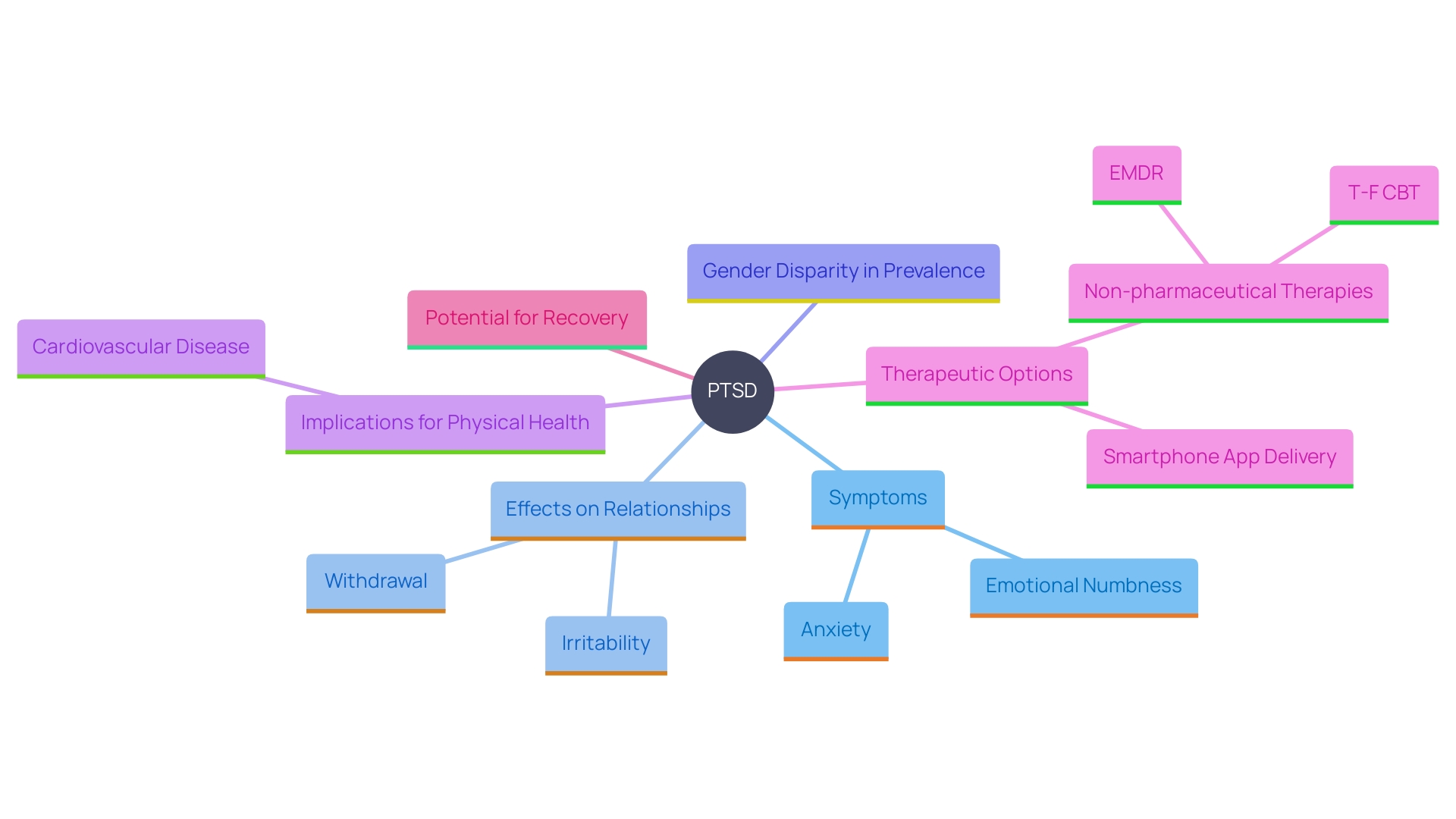
Common Challenges in Relationships with PTSD
Connections affected by post-traumatic stress disorder encounter different obstacles. Trust issues frequently arise, as trauma can distort perceptions of safety and security within the bond. Partners may grapple with feelings of helplessness, frustration, or even anger, as they navigate the emotional landscape shaped by the trauma. The study by Hammarberg et al. (2016) emphasizes the importance of understanding these dynamics, revealing that associates of individuals with PTSD often experience a mix of losses and gains as they strive to make sense of the trauma and adapt to shifting identities and relationships.
Moreover, accessing professional support can be a complex journey. While some collaborators report positive experiences, others feel increased stress or disconnected from the care process. This highlights the necessity for thorough, trauma-aware support that takes into account the distinct challenges encountered by both individuals and those close to them. As stated by Moreland-Capuia, trauma and recovery should involve all individuals, emphasizing the importance of systematic assistance and training to promote healing and empowerment.
Statistics further demonstrate the profound impact of trauma on mental health. For example, intimate partner violence is moderately associated with a 63% increased risk of major depressive disorders and a 35% increased risk of maternal abortion and miscarriage. These figures illustrate the wide-ranging effects of trauma and the critical need for evidence-based approaches to assist affected couples.
Effective solutions require patience, understanding, and a willingness to learn about the effects of trauma on emotional and relational functioning. Research suggests that couples therapy can be highly beneficial, with 70% of couples reporting positive outcomes from counseling. Methods that encourage cooperation, mutual openness, and understanding can convert the tension of discord into a zeal for play, ultimately enhancing the bond.
In conclusion, addressing the challenges encountered by couples experiencing trauma requires a multi-faceted approach that integrates professional support, systemic changes, and a deep understanding of trauma's impact. This holistic perspective can pave the way for healing and resilience, helping couples navigate their journey together.
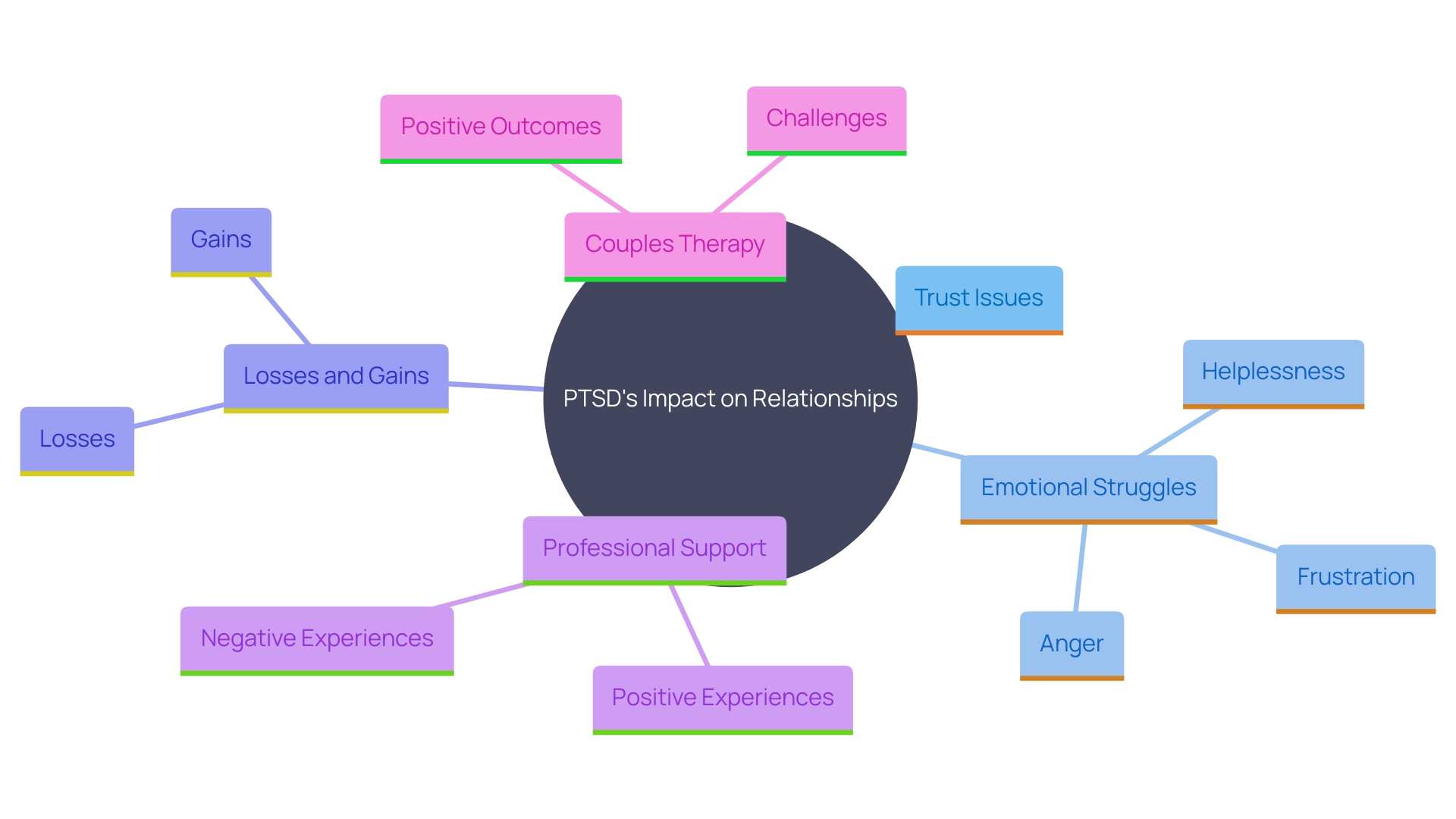
Impact on Trust, Closeness, and Communication
Post-traumatic stress disorder can profoundly affect trust and intimacy in relationships. Individuals with trauma often find it challenging to open up, fearing vulnerability or the potential for further hurt. This reluctance can lead to a breakdown in communication, where one partner feels unheard or dismissed, while the other may feel overwhelmed and unable to express their needs.
Research has highlighted that nearly all women in the US will encounter at least one significant traumatic event in their lives, making them twice as vulnerable to stress disorders compared to men. This high prevalence of PTSD-triggering experiences, coupled with its cardiovascular and neurocognitive impacts, exacerbates the emotional distance in relationships.
The emotional barriers established by post-traumatic stress disorder can foster resentment and frustration. Partners of individuals with PTSD navigate a complex landscape, marked by a juxtaposition of losses and gains. They strive and struggle to make sense of the trauma, shifting identities and connections, while seeking personal and professional support. As Julie Schwartz Gottman notes, “When you feel deeply attacked and there's no way out, people will move into flight or fight mode,” which impairs their ability to think and communicate effectively.
Research indicates that attachment anxiety and avoidance in romantic connections can affect how secure or insecure an individual feels with their partner. Mike’s situation, where he used alcohol to escape the negative feelings linked to his trauma, illustrates how these attachment insecurities can manifest. His experience underscores the importance of addressing these emotional barriers collaboratively to rebuild a foundation of trust and intimacy.
In the pursuit of rebuilding trust, relational processes such as sharing positive emotions, satisfying sexual experiences, and couple therapy can provide hope for becoming more secure in romantic connections. It is crucial for both individuals to collaborate, acknowledging the significant effect trauma has on their connection, and actively participating in the healing journey to promote a revitalized sense of intimacy and support.
Supporting a Partner with PTSD
Assisting someone with trauma necessitates a profound reservoir of understanding, tolerance, and a dedication to transparent dialogue. It is essential to create a safe space where your significant other can share their experiences without fear of judgment. Learning about post-traumatic stress disorder and its impacts can significantly improve awareness and empathy, allowing couples to manage its intricacies collectively. Studies have shown that associates of individuals with PTSD often experience a journey of losses and gains, striving to make sense of the trauma while shifting identities and relationships. Engaging in shared activities that foster connection, such as mindfulness or therapy, can be instrumental in promoting healing and intimacy.
Participant experiences with obtaining professional assistance vary widely; while some find it helpful, others report increased stress or a sense of disconnection from the care process. Therefore, being sensitive to your partner's unique needs and preferences is crucial. Culturally sensitive interventions have been found to be more effective, leading to increased utilization of health services and greater trust between patients and clinicians.
The role of peer assistance is also significant. Individuals navigating trauma who are supported by peers often feel less isolated and may seek treatment sooner, seeing others in similar situations progressing in their journeys. Research indicates that peer assistance can lead to greater utilization of health care services, a decrease in self-stigma, and reduced overall costs to the health care system. This underscores the importance of a community approach, where shared experiences and mutual support can pave the way for a more effective healing process.
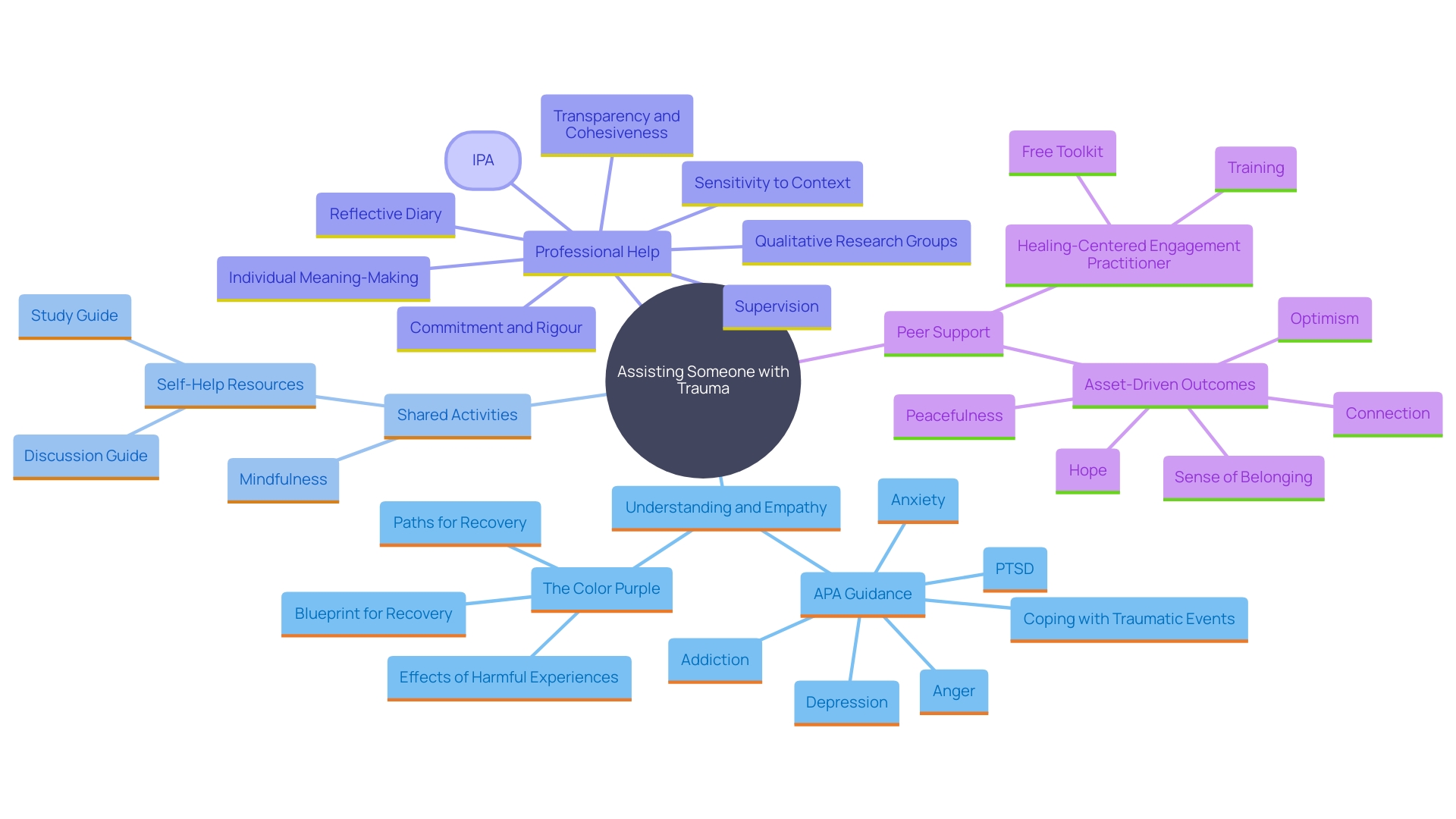
The Importance of Seeking Professional Help
Seeking professional assistance is essential for individuals and couples dealing with post-traumatic stress, as therapy provides a structured setting to address trauma and its impacts on relationships. Engaging with a trauma-informed therapist can provide partners with effective communication strategies, coping mechanisms, and emotional resilience. Research indicates that trauma-focused cognitive behavioral therapy is advantageous for adults, regardless of whether their post-traumatic stress disorder arises from a single or multiple traumatic events. This is promising news, as noted by Professor Richard Meiser-Stedman, who highlighted the importance of these findings for both patients and therapists.
Furthermore, the journey with post-traumatic stress often involves navigating complex emotions and shifting dynamics. A study on partners of individuals with post-traumatic stress disorder revealed a mix of appreciation and stress towards accessing professional support, underscoring the varied experiences in seeking help. This underscores the significance of locating a therapist who comprehends the relational effects of trauma.
Therapy can also promote a deeper comprehension of the connection dynamics influenced by post-traumatic stress. For example, individuals involved in a study on post-traumatic stress and personal connections described an ongoing process of losses and gains, attempting to understand the trauma and its effects on their identities and connections. This process underscores the importance of professional guidance in fostering healing and reconnection.
Overall, trauma-informed care not only addresses the immediate effects of post-traumatic stress but also works towards creating a supportive environment that empowers individuals and their significant others to thrive. The commitment to these therapeutic approaches, as advocated by experts like Moreland-Capuia, is essential in the collective effort to heal and overcome the challenges posed by trauma.
According to many of our clients (and healthcare professionals who refer them), our methods are faster than talk therapy, easier than willpower, and safer than medication.While decades-old approaches like cognitive behavioral therapy are considered the standard of care by the mainstream, why not use methods that are grounded in cutting edge neuroscience, such as memory reconsolidation, hypnosis, and NLP? After all, trauma and its negative effects are based in the subconscious, so that is where your intervention must focus to overcome them. Curious to know how we can help you with less time and effort than conventional methods? Learn more about our approach.
Strategies for Managing PTSD Symptoms in Relationships
Managing PTSD symptoms within a relationship is a dynamic process that requires both individuals to actively engage in fostering emotional safety and understanding. 'Creating routines and engaging in mindfulness are essential approaches that can assist both individuals in managing anxiety and sustaining emotional control.'. Grounding techniques, such as deep breathing exercises and sensory awareness, can also be beneficial.
Open communication about triggers and coping mechanisms is crucial. When both individuals discuss their experiences and strategies, it empowers them to navigate challenging moments together. This collaborative approach not only aids in managing trauma-related symptoms but also strengthens the relationship. Maintaining a balance between support and personal space is essential; establishing healthy boundaries ensures that both individuals feel respected and valued.
Research highlights the importance of understanding PTSD from multiple perspectives. Some individuals find relief and validation in their loved one's diagnosis, yet they often struggle with the lack of understanding from others. Professional assistance can be a mixed experience, with some finding it helpful and others experiencing increased stress. Regular evaluations and availability of resources can offer essential insights and assistance for companions, making the journey less intimidating.
Incorporating techniques to manage each other's emotions can also play a significant role. Research indicates that individuals who actively engage in managing one another's feelings report greater satisfaction in their connections and improved emotional health. This involves not just supporting each other during difficult times but also celebrating small victories together.
Ultimately, managing trauma within a partnership is about establishing a secure and supportive atmosphere where both individuals can flourish. By merging practical approaches with transparent dialogue and expert assistance, couples can turn their bond into a potent source of healing and development.
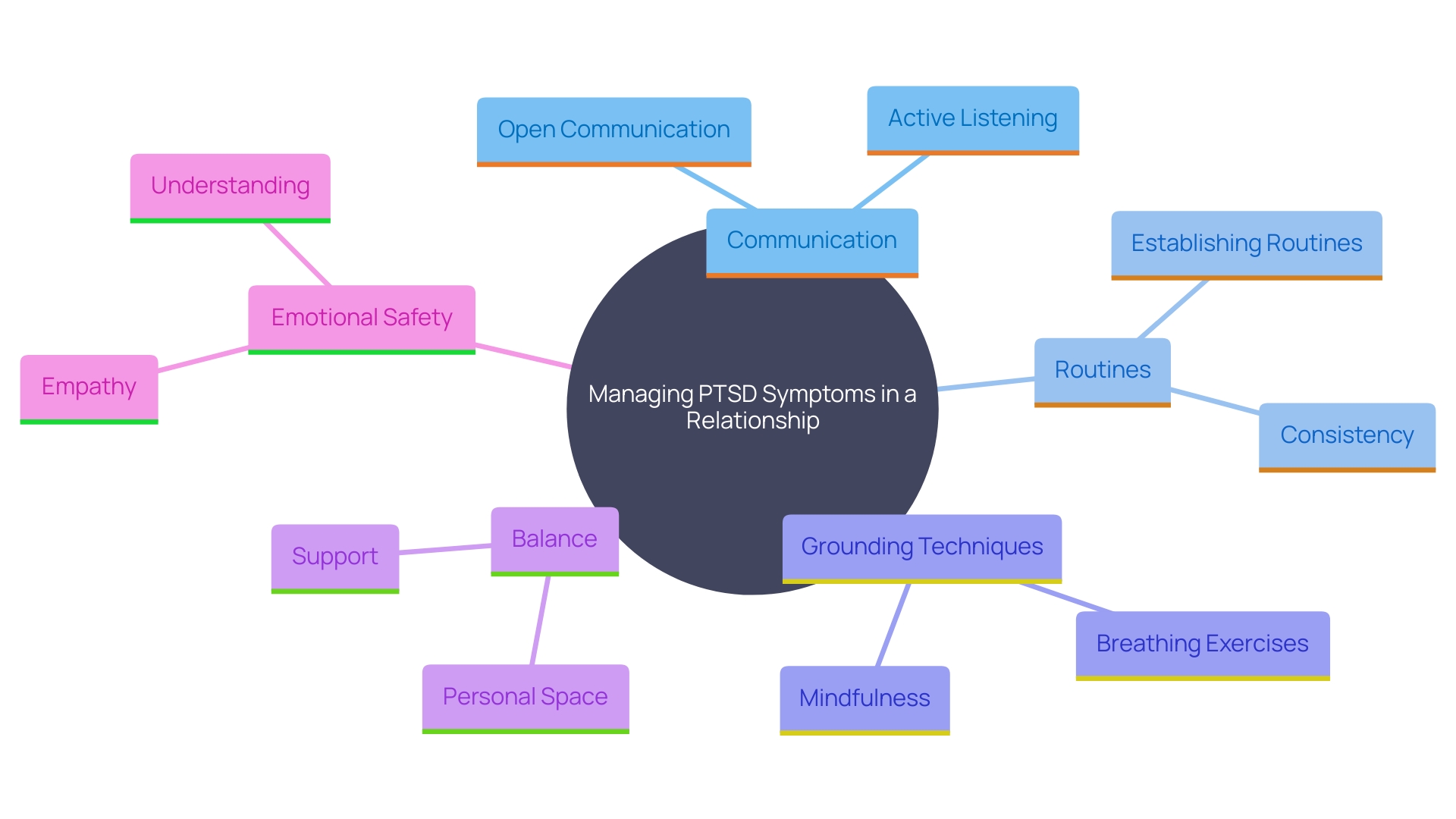
Building Resilience and Strengthening Relationships
Fostering resilience in connections impacted by PTSD is crucial for long-term healing and attachment. Research indicates that people with robust social connections are more inclined to heal from trauma and stress, and encouraging bonds offer the emotional assistance needed during difficult periods. Participating in activities that encourage bonding—like shared hobbies or support groups—can strengthen emotional connections and enhance satisfaction in partnerships. For instance, a study found that self-compassion in romantic relationships enhances happiness and satisfaction for both individuals, suggesting that training in self-compassion can be a valuable tool in couples’ therapy to improve relationship health.
Moreover, the journey of companions of individuals with PTSD often involves navigating a complex landscape of losses and gains, as described in participant experiences. Some collaborators expressed gratitude for expert assistance, while others reported heightened stress or felt detached from the care process. This highlights the importance of celebrating progress, however small, as it can provide motivation and encouragement, reminding both partners of their commitment to one another and their shared journey toward healing. As one participant observed, their experience was an ongoing process of striking and grappling to understand the trauma, changing identities and connections, and obtaining personal and professional support.
Training in self-compassion and maintaining strong, supportive relationships can thus play a crucial role in enhancing relationship satisfaction and resilience, helping couples navigate the ups and downs of trauma recovery together.
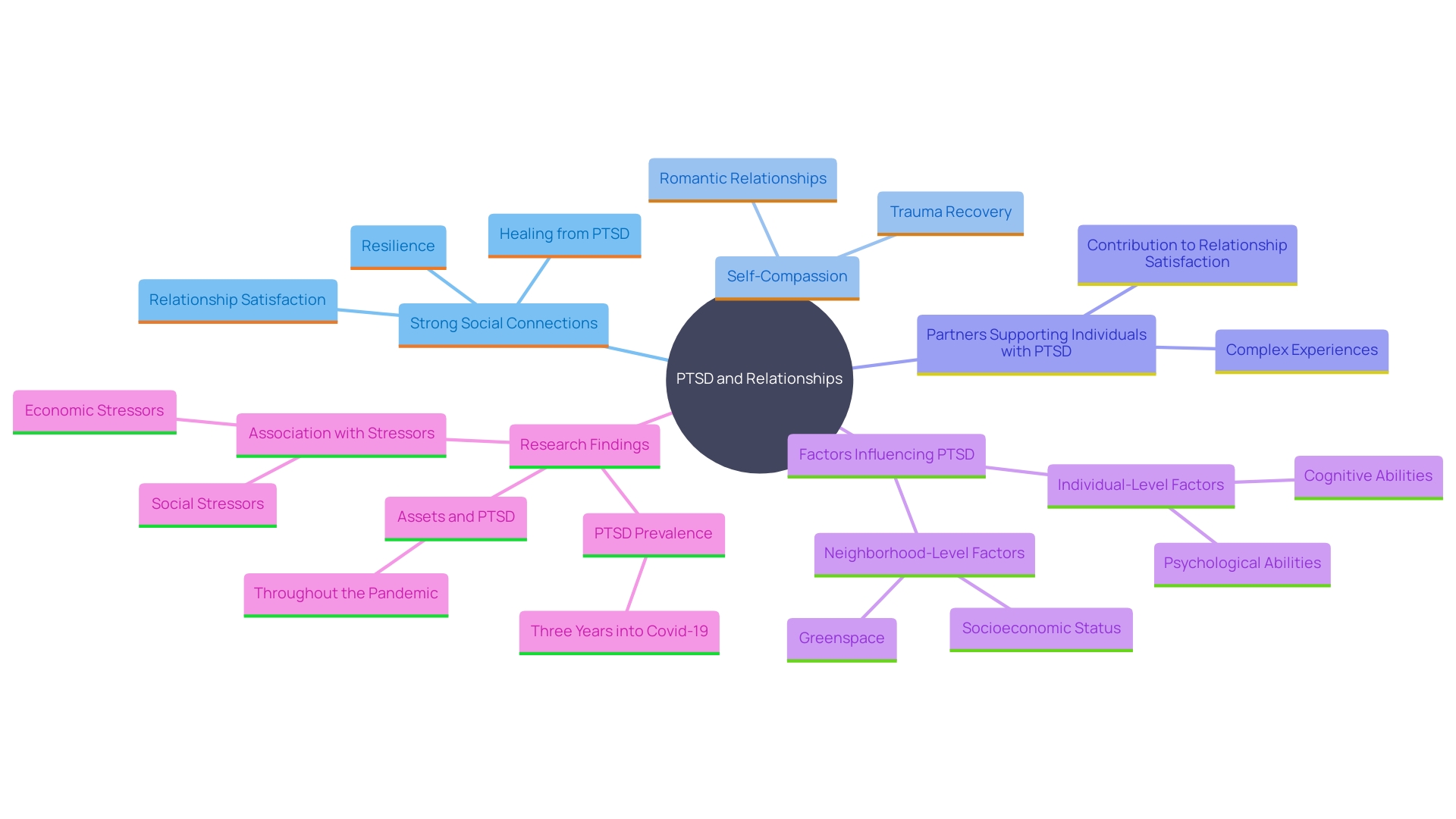
Conclusion
Navigating the complexities of relationships affected by PTSD can be challenging, yet understanding and compassion can pave the way for healing. The emotional barriers that arise from PTSD, such as heightened anxiety and communication difficulties, create a landscape where partners may feel isolated or confused. Recognizing these challenges is the first step toward fostering a supportive environment where both individuals can thrive.
The prevalence of PTSD, especially among women, underscores the importance of empathy and awareness in relationships. By acknowledging the broader implications of trauma, partners can cultivate patience and understanding. Engaging in therapeutic interventions not only benefits the individual experiencing PTSD but also enhances the dynamics of the relationship, promoting a collaborative journey toward recovery.
Building resilience through shared activities, open communication, and professional support can further strengthen the bond between partners. It is essential to create a safe space for vulnerability, where both individuals feel heard and valued. By working together to manage symptoms and celebrate small victories, couples can transform their relationship into a source of healing and growth.
In summary, while the challenges posed by PTSD can be daunting, they are not insurmountable. With commitment, understanding, and appropriate support, couples can navigate the emotional complexities of trauma, fostering a deeper connection and a renewed sense of intimacy. Embracing this journey together can lead to a more fulfilling and resilient partnership.




